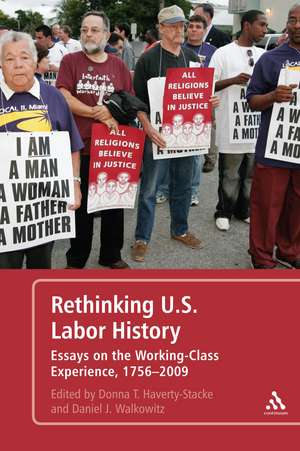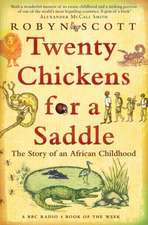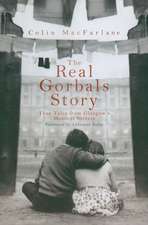Rethinking U.S. Labor History: Essays on the Working-Class Experience, 1756-2009
Editat de Dr. Donna T. Haverty-Stacke, Daniel J. Walkowitzen Limba Engleză Paperback – 22 dec 2010
Preț: 267.75 lei
Preț vechi: 326.63 lei
-18% Nou
Puncte Express: 402
Preț estimativ în valută:
51.23€ • 53.64$ • 42.50£
51.23€ • 53.64$ • 42.50£
Carte disponibilă
Livrare economică 19 martie-02 aprilie
Preluare comenzi: 021 569.72.76
Specificații
ISBN-13: 9781441145758
ISBN-10: 1441145753
Pagini: 352
Dimensiuni: 150 x 226 x 23 mm
Greutate: 0.54 kg
Editura: Bloomsbury Publishing
Colecția Continuum
Locul publicării:New York, United States
ISBN-10: 1441145753
Pagini: 352
Dimensiuni: 150 x 226 x 23 mm
Greutate: 0.54 kg
Editura: Bloomsbury Publishing
Colecția Continuum
Locul publicării:New York, United States
Caracteristici
The pull of Danny Walkowitz and the team of contributors behind him will help make this a successful volume. Walkowitz is a senior scholar in the field and widely respected. Several contributor publications are now required reading.
Cuprins
Contributors1. Introduction Donna Haverty-Stacke and Daniel J. Walkowitz.PART I. CURRENT RESEARCH2. Memoirs of an Invalid: James Miller and the Making of the British-American Empire during the Seven Years' War Peter Way 3. Losing the Middle Ground: Strikebreakers and Labor Protest on the Southwestern Railroads Theresa Case4. Rethinking Working-Class Politics in Comparative-Transnational Contexts Shelton Stromquist 5. No Common Creed: White Working-Class Protestantisms and the CIO's Operation Dixie Ken Fones-Wolf and Elizabeth Fones-Wolf6. A. Philip Randolph, Black Anticommunism, and the Race Question Eric Arnesen 7. The Contextualization of a Moment in CIO History: The Mine-Mill Battle in the Connecticut Brass Valley During World War II Steve Rosswurm 8. Organizing the Carework Economy: When the Private Becomes Public Eileen Boris and Jennifer Klein 9. Solvents of Solidarity: Political Economy, Collective Action, and the Crisis of Organized Labor, 1968-2005 Joseph McCartinPART II. NEW DIRECTIONS IN U.S. LABOR HISTORY10. Sensing Labor: The Stinking Working-Class after the Cultural Turn Dan Bender 11. Re-imagining Labor: Gender and New Directions in Labor and Working Class History Liz Faue 12. The Limits of Work And The Subject of Labor History Zach Schwartz-Weinstein PART III. RESOURCESChronology Resources Further Reading Index
Recenzii
"Drawing on new as well as seasoned talents to probe the outer limits of a rapidly evolving field, Rethinking U.S. Labor History will undoubtedly take its place as a valuable marker of the discipline's own history." --Leon Fink, University of Illinois at Chicago
"Much the way Walkowitz and Michael Frisch did a quarter century ago with Working-Class America, this superb new volume of essays illustrates the state of the field while setting the agenda for the next generation of U.S. labor history. While attentive to the intersections of class and culture that have animated much recent scholarship, this volume also offers a renewed focus on the structural factors that have impinged on workers' lives. Some of the most interesting essays explore how aspects of working-class culture and consciousness offered resistance to the entreaties of organizers, militants, and strikers, matters historians have too often ignored. Yet others consider the past in light of the new demographics and sectoral dimensions of today's labor force, while emphasizing the power of the state and transnational links to shape working-class lives. Collectively, Walkowitz's and Haverty-Stacke's contributors insist that U.S. labor historians rethink for the politics of a new century the shop-worn definitions of our essential subjects: work and the worker. If "labor" has a future in our neo-liberal era-as a material practice, a form of social organization, and a subject fit for close study-clues to its dynamics will be found in these pages." --Alex Lichtenstein, Florida International University, USA
"Much the way Walkowitz and Michael Frisch did a quarter century ago with Working-Class America, this superb new volume of essays illustrates the state of the field while setting the agenda for the next generation of U.S. labor history. While attentive to the intersections of class and culture that have animated much recent scholarship, this volume also offers a renewed focus on the structural factors that have impinged on workers' lives. Some of the most interesting essays explore how aspects of working-class culture and consciousness offered resistance to the entreaties of organizers, militants, and strikers, matters historians have too often ignored. Yet others consider the past in light of the new demographics and sectoral dimensions of today's labor force, while emphasizing the power of the state and transnational links to shape working-class lives. Collectively, Walkowitz's and Haverty-Stacke's contributors insist that U.S. labor historians rethink for the politics of a new century the shop-worn definitions of our essential subjects: work and the worker. If "labor" has a future in our neo-liberal era-as a material practice, a form of social organization, and a subject fit for close study-clues to its dynamics will be found in these pages." --Alex Lichtenstein, Florida International University, USA









